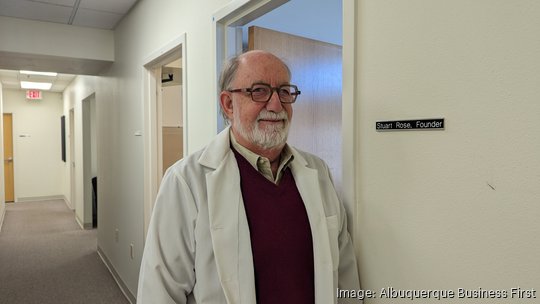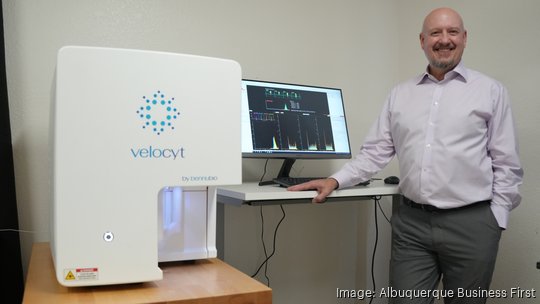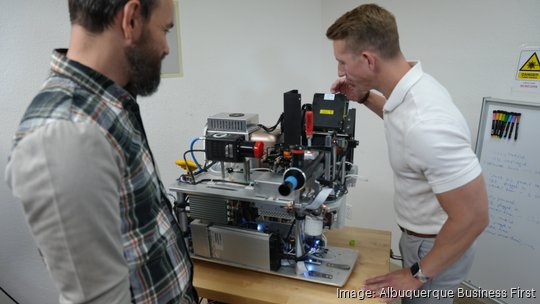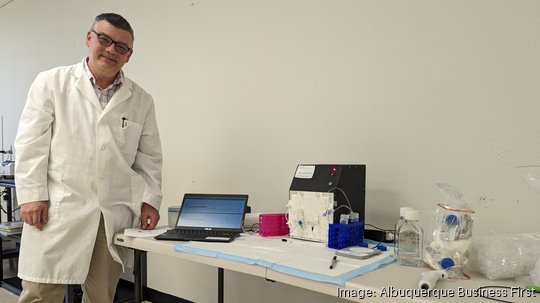It's been over two months since New Mexico Gov. Michelle Lujan Grisham vetoed Senate Bill 382 — a three-page piece of legislation that would have seen the State set aside $25 million for bioscience investment.
For every $1 New Mexico would contribute to a "bioscience development fund," a chosen investment partner would contribute $2 — meaning a total of $75 million would have been dedicated to bioscience co-investment in the state.
An amended version of the bill, which dropped the State's contribution down to $25 million from the $50 million included initially, passed the New Mexico Senate and House of Representatives with unanimous approval.
In her veto message, Lujan Grisham wrote that the bill's goal of bringing bioscience companies to the state through matching investment is "sound," but cited issues with a lack of "mechanisms to protect the public investments" if invested-in companies were to fail or leave New Mexico.
For an industry that the state's Economic Development Department has targeted for growth, and with widespread legislative support, some leaders in the sector were surprised by the governor's action. But what does that decision actually mean for the target industry, and where could things go from here?
The role of the New Mexico Bioscience Authority
In late March 2017, then-Governor of New Mexico Susana Martinez signed the Bioscience Development Act into state law. Enacted through Senate Bill 478, it created the New Mexico Bioscience Authority.
"The 'New Mexico bioscience authority' is created as a public-private partnership," the bill reads, "which shall be formed pursuant to the Nonprofit Corporation Act, representing a collaborative among state government, research institutions, national laboratories and private industry in New Mexico."
Fast forward to the present, and the Bioscience Authority has, well, solidified itself as an authority in the sector and is run by Stephanie Tofighi, its executive director.
"What I see the Bioscience Authority as doing is being … this overarching mechanism that can direct people to where they can find resources to help them out in the bigger picture of increasing the amount of [bioscience] industry," Tofighi said.

New Mexico's Bioscience Authority is "administratively attached" to the University of New Mexico, meaning that its staff are technically employees of the university. It also means that the authority can be "audited regularly" by UNM, Tofighi said.
Money for the Authority comes from a mix of sources, including grants, donations and federal and state appropriations. Funding that the Bioscience Authority does get from the State of New Mexico Tofighi described as "minimal" — paying primarily for two full-time and one part-time staff and rent for an office space in Albuquerque's Innovation District.
That could have changed dramatically with the proposed co-investment bill. The $25 million in State money set aside through the amended version of that bill would have been administered through the Bioscience Authority, in collaboration with established investment firms, in the form of matching partnerships.
Such "co-investment" in growing bioscience companies through the Authority is already one of its primary programs, Tofighi said.
Econsult Solutions Inc., a Philadelphia-based strategic economic consulting firm, helped the Bioscience Authority put together a 37-page strategic plan, published in early 2020.
"They were the ones that said 'this is what you need,'" Tofighi said. "You need a $25 to $50 million co-investment fund and you need a $100 million endowment fund."
The endowment fund would be used to create a grant system for young bioscience companies to purchase necessary equipment, she said. The co-investment fund, in contrast, would act as that matching partnership between the Authority and venture firms to pump money into promising bioscience startups.
A lack of investment capital and financing for bioscience companies in New Mexico is one weakness outlined in the strategic plan. It's also something leaders in the sector, like Stuart Rose, have seen over the years.
"We're always trying to find investors in New Mexico companies," Rose, an entrepreneur, bioscience investor and founder of The Bioscience Center in Albuquerque, said. "This [veto] is sending a message that we don't invest in our own."

Some companies, including those in the biosciences, have received money from the New Mexico Catalyst Fund — a separate matching investment fund that the State set up in 2016 in partnership with Santa Fe-based investment firm Sun Mountain Capital. Those companies are now looking for more money to continue their growth, Rose said.
Without the bioscience co-investment fund, "there's no obvious source of that next $1 million to $2 million that would be used to get them national attention," he said.
"The danger is that companies that look promising now, that are beyond that really early stage, won't find the capital to prove that their technology or their idea is really viable," Rose said. "That's what this fund would have done."
Dale Dekker, the chair of the Bioscience Authority and founding principal and brand ambassador for Dekker Perich Sabatini, has seen a similar trend. He told Albuquerque Business First, "One thing we consistently hear is that there's a lack of early-stage and growth investment for New Mexico companies."
The idea, for people like Dekker, is that co-investment between the Authority and dedicated venture firms could help point that trend in the opposite direction.
Making a case for bioscience co-investment
The first such co-investment happened late last year when the Bioscience Authority teamed up with the New Mexico Vintage Fund, an early-stage investment firm that's a partner of the angel membership organization New Mexico Angels, to invest $225,000 in Albuquerque bioscience company BennuBio. It's what Dekker called a "pilot" for the type of investment the bill would have established.
John O'Rourke became president and CEO of BennuBio in October 2022 after first joining the company in 2021 from Sartorius, a biotechnology company based in Albuquerque, where he helped lead product development for Sartorius' flow cytometry division.
He came across BennuBio while conducting technology scouting at Sartorius.
"I couldn't pronounce its name but it had a really interesting technology," O'Rourke said about BennuBio. "So, I kept my eye on it for a long time because I really knew they had some disruptive technology that, if guided in the right way, could be a game changer in the cancer space."

That "game-changer" tech is a simplified way to analyze 3D multicellular models "to advance biological discovery and accelerate drug development," O'Rourke wrote in an email to Business First. It's an advancement in an area of bioscience called cytometry, where instead of analyzing single cells, the startup's technology analyzes cell clusters like organoids.
BennuBio is in the "commercialization phase" for that technology, he said, and the company recently landed its first placement at the University of New Mexico's Health Science Center.
Three more placements could arrive by the end of the year, O'Rourke said. The company has five full-time employees and five part-time or consultant staff.
Money through the Bioscience Authority's co-investment helped the company retain "core team members" that it otherwise would have had to lay off, O'Rourke said. It also allowed the company to secure inventory to be able to move those upcoming placements forward.
O'Rourke testified in front of the New Mexico Legislature in favor of the co-investment bill. It doesn't always have to be a lot of money, he said, to keep companies going. He said $500,000 to $1 million can help keep doors open.
"What I see is you're going to have to have a reduction in staff, reduction in force, to keep runways extended," O'Rourke said about more funding not being made available to early-stage companies.
"Without that money to help us along, I think you could see doors shuttered here and the loss of some really cool technology," he continued. "So, that's the biggest worry I have."

What's next for the bioscience sector in New Mexico?
Tofighi, executive director of the Bioscience Authority, led the authority's multi-year effort to advocate on behalf of the co-investment fund after an early version of the bill failed to make it out of committee in 2020.
She was surprised when this year's amended version passed both chambers with unanimous approval. But once it was on the governor's desk, the tone started to change.
"By Thursday, we were like, 'all right, we've got one day left, and there's still no signing,'" Tofighi said. "That's when we started getting apprehensive and that was when we got the rumor that she was thinking of vetoing it.
"So that was when we started pummeling her with educational material and being like, 'Hey, this is what it is, this is what we're doing, this is why it's so important.'"
Lujan Grisham, of course, did veto the bill. Her office didn't respond to a request for comment for this article.
For Tofighi and other industry leaders, that veto doesn't mean efforts to pull in bioscience investment and grow the sector will slow down.
Tofighi said she set up meetings with close to a dozen investment firms at the BIO International Convention, held in Boston between June 5 and June 8. Those firms, if they choose to invest, would join the New Mexico Vintage Fund and Anzu Partners, a national venture firm that's invested in some New Mexico bioscience companies like Rio Rancho-based Nature's Toolbox, as co-investment partners with the Bioscience Authority.
Other bioscience founders from New Mexico, like Sergey Dryga from Q Biotech, also made the trek to Boston to network with possible investors. Over 14,000 biotechnology and pharmaceutical leaders typically attend the convention, according to its website.

Tofighi said New Mexico's Bioscience Authority wants to try to land around $5 million from the State Investment Council — an institutional investment firm that manages over $30 billion in permanent and governmental funds for the state — for another co-investment opportunity. But for right now, she said, the Authority's co-investment coffers have run dry.
"The reason that investing is so important for bioscience companies is because you have such a long road to move through before you're making anything," Tofighi said. "You have to pay staff, you have to pay for your facility, you have to pay for your equipment, and yet you're not making anything.
"So the companies that have been able to make it, they are in states where there is a partnership in place between the State's money and the company," she continued. "We're not asking the State to give away money, we're not asking the State to give tax credits — we're asking the State to make an investment in these companies."
Investments that would have been propelled by the $25 million through the proposed bill could have been spread out over smaller increments to dozens of companies, instead of larger investments in just a few, said Dekker, the Bioscience Authority's chair. That's one way, he said, to diversify the industry and mitigate potential risk.
"Overall, I think the history of investing in the biosciences, if you've got a good co-investment partner, which I think we would find, is that you're going to get a much greater rate of return," Dekker said.

If the bill had been approved, equity in companies the Bioscience Authority would have received through its co-investments would have been returned to a Bioscience Development Fund in the form of cash once the invested-in company's shares were bought by a new owner, according to a bill explainer Dekker shared with Business First.
Because of New Mexico's bioscience history and those potential returns, Dekker sees a path forward for the State's support of a similar co-investment bill.
"We're not discouraged," he said. "We're just that much more determined as an Authority to get this done because we believe, quite frankly, that it's going to help the state in a number of ways."









